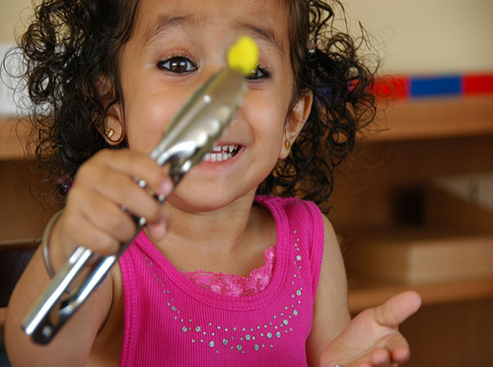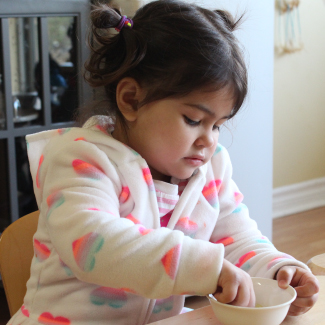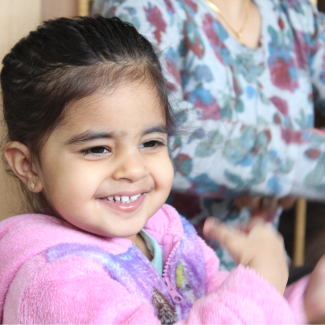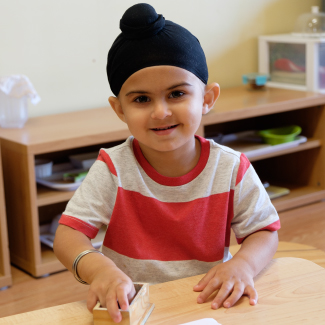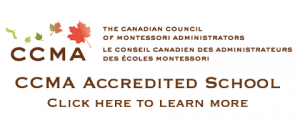Parent visits to the school are welcome. Please make an appointment for any in-class observations. Classroom observations can be disruptive to the learning environment. In-class observations will be limited to one half an hour with a prior appointment. Observation from the hall is allowed at any time for any length of time.
Many valuable articles of clothing remain unclaimed each year. Proper identification on coats and other articles of clothing will help to assure the return of lost articles. The school is not responsible for lost or damaged personal items. All unclaimed items are donated on the last day of school to a charitable organization.
Our goal is to provide an atmosphere and learning environment that is safe, supportive and nurturing for each student. The code established for the students attending the school will not inhibit their natural creativity and social growth.There is a strict code of conduct, which includes no hitting, kicking, biting, scratching and/or fighting. Also, appropriate language must be used at all times. Respect when speaking to teachers, students and any adult is mandatory.
In managing the children’s behaviour, under no circumstances will the teachers:
- use corporal punishment on a child (e.g., slapping, kicking, punching, pushing, grabbing, pulling, spanking, ear pulling, biting, etc.)
- use deliberate harsh or degrading measures on a child that would humiliate the child or undermine his or her self-respect
- engage in emotional abuse, name-calling, shaming, making derogatory remarks or humiliating a child
- deprive a child of basic needs including food, shelter, clothing or bedding
- use a locked or lockable room or structure to confine a child who has been withdrawn from other children
- shout or yell at a child
- threaten a child by saying that negative reports will be given to their parents
- compare one child to another
- send the child out of the classroom, out of teachers’ view
Disruptive Behaviour Policy
When excessive disruptive behavior occurs at the school, the following procedures are enforced:
1. The first occurrence will result in a conversation with the child and/or parent to discuss expected behavior and an incident report will go home to the parents.
2. The second incident of disruptive behavior will result in the parents being called in for a conference to go over expected behavior and/or required to pick up the child.
3. The third time the child engages in the behavior, the parents are called and the child is required to leave school for the day.
4. At the fourth disruptive event, the parents are asked to get behavior counseling for the child and family. A letter is required from the counselor notifying the school that the counseling process has started. Once the counseling starts, a behavior plan must be submitted immediately.
If your child instigates what is considered dangerous behavior, for the safety of all staff and students, we will go directly to step 4.
Note: When a parent is called to pick up their child, we require the child be picked up within one hour.
Accidents
If a child is injured at school, the parents are called immediately. If we cannot reach parents, the persons listed on the Emergency Contact List are contacted. It is extremely important that we have received accurate information filled out in the enrollment application. PLEASE KEEP THIS INFORMATION UPDATED.
Your assistance in providing complete information on the Emergency Card is greatly appreciated. In order to be prepared for such emergencies, please notify us of any changes on your child’s emergency card, especially changes in address, home, work or cell phone numbers, etc.
Procedures for life threatening emergencies require the school staff to respond in the following sequence:
All phones throughout the school post emergency phone numbers.
- One staff member will stay with the injured or ill child, and take appropriate steps for the injury/ illness (CPR, First Aid, etc.
- The child’s teacher or available staff member will call 911, describe the situation, give our location and phone number and stay on the line until the dispatcher has indicated that they have all the necessary information. If possible, one staff member will stand outside to meet the emergency team.
- A staff member will gather the child’s file and have it available for use.
- A staff member will contact the parents/guardians as soon as emergency care has been obtained.
- The staff member will determine how and where the parent would like their child to receive medical care.
- Transportation to a care facility is arranged through the rescue team or the parent. The school will not be responsible for transporting the child in an emergency.
- A staff member will accompany the child and stay with the child until the parent arrives. An accident report is completed and signed by the staff member on duty and a copy is sent to the MCYS immediately. One copy of the accident report is given to the parents and one copy is kept in the child’s file at school.
- In the event that the parents cannot be contacted, the emergency contacts located on the child’s emergency card will be contacted. Parents are expected to update emergency information and availability quarterly.
Minor Emergencies:
In the case of minor emergencies such as small cuts, bruises, strains or bumps, the following procedure is used:
- A staff member trained in first aid will take appropriate steps.
- An Accident Report form and/or a head injury form is completed by the staff member and kept in the medical logbook and a copy is provided to the parent.
- All incidents are recorded in the student’s log. Information to be included: date, time, and details of injury, action taken/treatment given and the staff member’s signature.
- Head injuries are reported to the parents on a head injury form.
- All injuries are discussed with the Director regarding whether the parents will be notified immediately or when the child is picked up. If the parent is called, the time of the call and conversation are documented.
Accidental Poisonings:
If the child is experiencing any acute physical distress follow the steps under “Emergency Procedures”.
- If a non-emergency, the Director or staff member will call the Poison Control Center at 1-800 268-9017 immediately.
- Instructions given by the Poison Control official are followed.
- The remainder of the poisonous material is saved for proper identification.
- The parents of the child are contacted as soon as possible.
- The incident is recorded in the student’s log and reported to the MCYS if the situation warrants.
- SYRYP OR IPECAC is not given unless instructed by 911 or Poison Control.
The school takes every precaution to maintain the wellness of each student who attends our program. The first step taken is to require that children have had a recent physical exam and all of the necessary immunization shots or equivalent alternative medicine solution. Staff members have immediate contact with children when they enter the school in order to detect any noticeable health conditions. Staff members are required to take annual training in infectious disease control and universal precautions for the transmission of diseases. In addition, students and staff alike are required to wash their hands consistently throughout the day in order to prevent the spread of germs.
Even with all of the precautions that are taken, viruses and other illnesses will still exist at school. In the event that a child contracts a communicable disease, the school will post a note at the front entrance. The note will state what disease has been contracted; list some of the symptoms, and the approximate incubation period.
If a child has a known medical condition (asthma, allergies, diabetes, etc.), parents are asked to note it on the proper place on the enrollment form. Teachers should also be notified of the steps to take if a problem occurs while the child is at school.
Whenever a child is to be given any medicine, including over-the-counter medicine, a parent must complete a Medication Authorization Form. Teachers may not give any type of medication unless this form is completed. Parents should ask the child’s teacher for the form, complete it, and give it and the medicine DIRECTLY to a teacher or staff member. Children may not bring their own medicine to school. The medicine must be in its original container, with a label specifying dosages, etc.
Beyond the medical health of our students, their physical safety is also looked after. The school staff is trained in first aid and CPR. First aid kits are present in each of the classrooms, and the dining room. If an accident should occur, a staff member will administer simple first aid. In the event of a more serious injury, an emergency vehicle will be called and the child will be taken to the doctor or hospital designated in the enrollment forms. A parent, or if necessary, an emergency contact, will be contacted immediately thereafter. After any injury is treated, an accident report will be written up to explain what happened and what treatment was performed. Parents will receive a copy of the report.
Emergency Drills
THE SCHOOL has emergency drills throughout the year. Safety, order and control are the primary purposes of emergency drills. Speed in emptying the building, while desirable, is not the object and is secondary to the maintenance of proper order and discipline. The first few drills of the year are announced in advance. All remaining drills are unexpected and occur at different times of the day.
The school has also developed a series of procedures to follow in the event of a fire, natural disaster or other catastrophe. Staff members receive training on these policies at orientation, and at other times during the year. Anyone wishing to view these policies may obtain a copy of them from the office. In the event that the school should ever need to be evacuated, the children would be walked down to the Dashmesh Darbar, located in the same plaza – The Gore Plaza.

